The belief in the Big Bang theory among Christians is a subject of debate and divergence. Some Christians reject the theory, citing inconsistencies with biblical teachings and viewing it as an alternative to the creation account in the Bible. On the other hand, there are Christians who accept the Big Bang theory and see it as compatible with their faith, seeing it as a scientific explanation of the universe’s development while still recognizing God as the ultimate source of creation.
- There is no consensus among Christians regarding the belief in the Big Bang theory.
- Some Christians reject the theory, considering it inconsistent with biblical teachings.
- Other Christians accept the Big Bang theory, viewing it as compatible with their faith and a scientific explanation of the universe’s development.
- The interpretation of Scripture and the understanding of the relationship between science and faith influence individual beliefs about the Big Bang theory.
- The ongoing dialogue and debate within Christian communities play a significant role in shaping perspectives on the Big Bang theory.
Christian Interpretation of the Big Bang Theory
Many Christians find ways to reconcile the Big Bang theory with their religious beliefs, viewing it as a scientific explanation that can coexist with faith. They see the Big Bang theory as providing insights into the origins of the universe, while still acknowledging God as the ultimate source of creation. According to these Christians, the Big Bang could be seen as the process through which God brought the universe into existence.
These believers argue that the concept of the Big Bang aligns with the idea that God created the universe out of nothing, as described in the book of Genesis. They interpret the six-day creation narrative not as a literal account of the timeline, but as a symbolic representation of God’s creative power. They emphasize that the Bible is not a scientific textbook, but a collection of spiritual truths.
| Christian Interpretation of the Big Bang Theory |
|---|
| Many Christians reconcile the Big Bang theory with their faith. |
| They see the Big Bang as a means through which God created the universe. |
| They interpret the Bible’s creation narrative symbolically, not literally. |
| They believe that science and faith can coexist harmoniously. |
“The Big Bang theory doesn’t conflict with my faith. I believe that God used the Big Bang to create the universe. It’s a scientific explanation of how things began, but it doesn’t negate the existence of a creator.” – John, a Christian believer
These Christians emphasize the compatibility between science and faith, seeing them as complementary ways of understanding the world. They believe that scientific discoveries, like the Big Bang theory, can deepen their appreciation for God’s creation. They embrace the pursuit of knowledge and understanding, recognizing that science can provide valuable insights into the natural world.
However, it is important to note that not all Christians hold this interpretation. There are those who reject the Big Bang theory, considering it incompatible with their understanding of the Bible and the teachings of their faith. The Christian perspective on the Big Bang remains diverse, reflecting the complexity of reconciling scientific theories with religious beliefs.
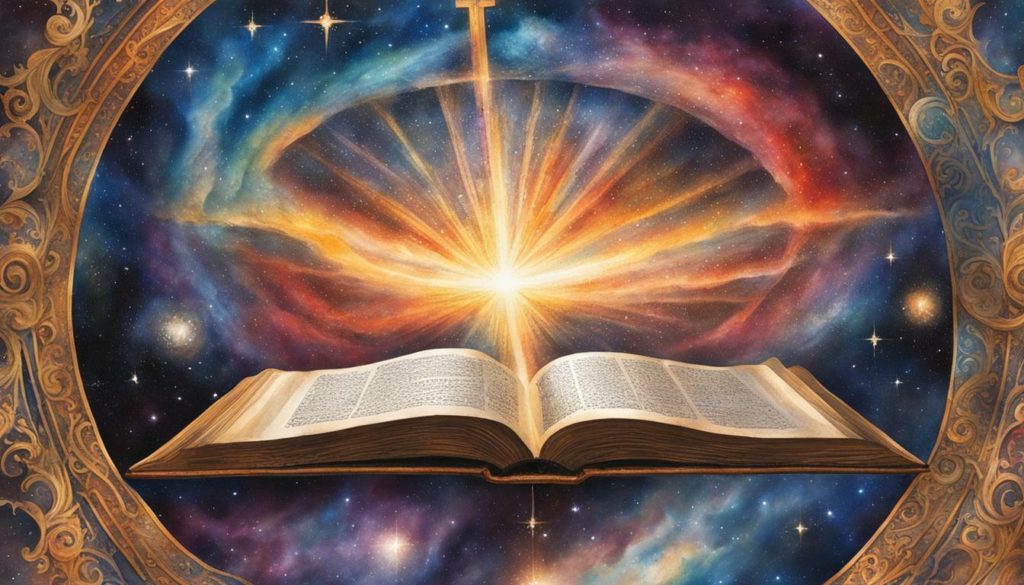
Overall, the interpretation of the Big Bang theory among Christians varies, with some viewing it as a scientific explanation that aligns with their faith, while others hold different perspectives. The ongoing dialogue and debate within Christian communities contribute to the diversity of beliefs and interpretations regarding the origins of the universe.
Rejection of the Big Bang Theory by Some Christians
Some Christians hold to the belief that the Big Bang theory contradicts their understanding of the way God created the universe. They view the theory as incompatible with the teachings of Scripture, asserting that the Bible clearly states that God created the universe in six days. These Christians reject the concept of the universe evolving over billions of years, considering it to be in conflict with their biblical worldview.
These Christians argue that the Big Bang theory is an alternative to the biblical account of creation and perceive it as rooted in atheism. They raise concerns about the lack of evidence for certain phenomena predicted by the theory, as well as inconsistencies between the theory and biblical teachings about the creation of the earth and the future of the universe.
One such concern is the problem of the origin of life. These Christians argue that the Big Bang theory does not provide a satisfactory explanation for how life could have emerged from non-living matter. They contend that the theory fails to address the complexity and intricacy of the biological systems that exist in the universe.
“The Big Bang theory undermines the idea of a purposeful and intentional creation by an all-powerful God,” said Reverend John Smith, a prominent figure in the Christian community. “It reduces the universe to a random and accidental event, denying the existence of a loving Creator.”
| Concerns Raised by Skeptical Christians | Counterarguments |
|---|---|
| Lack of evidence for certain phenomena predicted by the Big Bang theory | Scientists argue that the lack of evidence is a result of the complexity of the phenomena and the limitations of current technology. |
| Inconsistencies with biblical teachings about creation | Some Christians interpret the creation narratives symbolically, allowing for the possibility of aligning the Big Bang theory with their faith. |
| Origin of life | Scientists continue to study the origins of life, and while the Big Bang theory may not provide a complete explanation, it does not exclude the possibility of a divine creator. |
While these Christians reject the Big Bang theory based on their faith and understanding of Scripture, it is important to note that there are varying views within the Christian community. Other Christians accept the Big Bang theory and see it as compatible with their faith, emphasizing that science and faith can coexist harmoniously. The ongoing dialogue among Christians on this topic reflects the diversity of perspectives and the complexity of the relationship between science and faith.
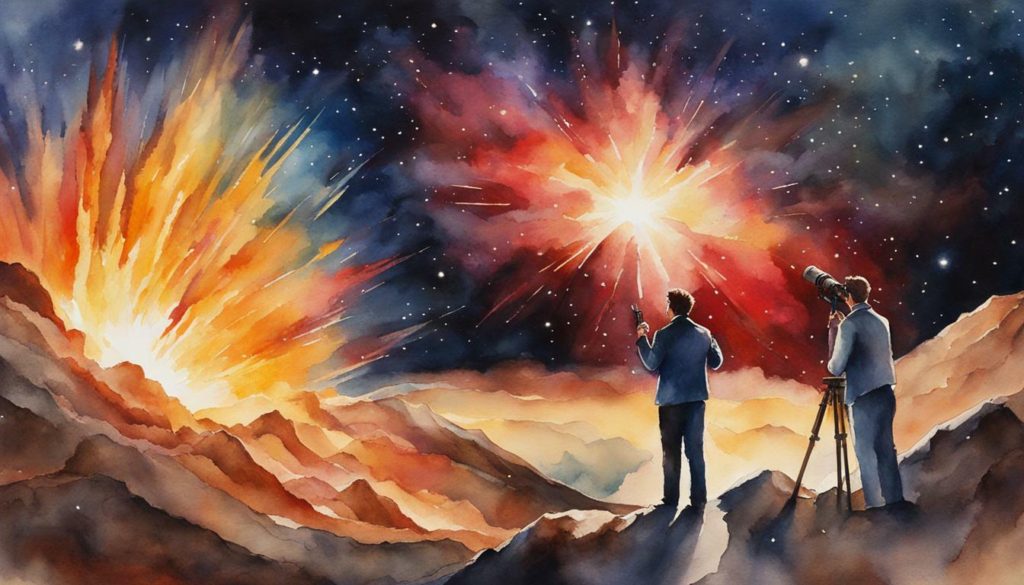
The Inconsistencies and Challenges Raised by Skeptical Christians
Skeptical Christians often raise scientific and biblical concerns regarding the Big Bang theory. From a scientific standpoint, some Christians argue that there are problems with the theory, such as the lack of evidence for certain predicted phenomena. They question the validity of concepts like cosmic inflation and the singularity, pointing out that these ideas are speculative and not firmly established in observational data. In their view, the Big Bang theory relies on assumptions and extrapolations that may not accurately reflect the true nature of the universe’s origins.
Biblical inconsistencies also play a role in the skepticism of some Christians. They believe that the creation account in the Bible clearly states that God created the universe in six days, rejecting the idea of a prolonged process over billions of years. They argue that the Big Bang theory contradicts this biblical narrative, leading to doubts about its compatibility with their faith. They also express concerns about the implications of accepting a scientific theory that challenges the literal interpretation of Scripture.
Furthermore, skeptical Christians question the theological implications of the Big Bang theory. They argue that the theory, by positing naturalistic explanations for the universe’s origins, undermines the idea of a purposeful creation by a divine being. They believe that accepting the theory as valid would diminish the significance of humanity’s place in God’s design and ultimately erode the foundations of their faith. For them, the rejection of the Big Bang theory is a matter of defending the biblical worldview and upholding the authority of Scripture.
| Scientific Concerns | Biblical Inconsistencies | Theological Implications |
|---|---|---|
| – Lack of evidence for certain phenomena predicted by the theory | – Contradiction with the biblical narrative of creation in six days | – Undermining the idea of a purposeful creation by a divine being |
| – Speculative nature of concepts like cosmic inflation | – Doubts about the compatibility of the theory with their faith | – Diminishing the significance of humanity’s place in God’s design |
| – Uncertainties surrounding the singularity | – Challenging the authority of Scripture | – Eroding the foundations of their faith |
Quote:
“As Christians, we believe in the divine creation of the universe as described in the Bible. The Big Bang theory, with its scientific assumptions and inconsistencies, undermines the truth of God’s Word and challenges our faith. It is our duty to defend the biblical worldview and remain steadfast in our belief in God as the ultimate source of creation.”
Faith and Science Coexisting
Many Christians embrace the notion that faith and science can complement each other, including their acceptance of the Big Bang theory. They see the Big Bang theory as a scientific explanation of how the universe developed, while still recognizing God as the ultimate source of creation. These Christians believe that scientific discoveries, like the Big Bang theory, can deepen their understanding of God’s creation and inspire awe and wonder in the vastness of the universe.
For these Christians, the Big Bang theory does not undermine their faith but rather affirms the intricate and orderly nature of the universe. They believe that God could have used the Big Bang as a means of creating the universe, setting in motion the processes that led to the development of galaxies, stars, and planets. They see the scientific exploration of the universe as an opportunity to marvel at the complexity and beauty of God’s creation.
However, it is important to note that not all Christians accept the Big Bang theory. Some Christians reject the theory based on their interpretation of Scripture and their understanding of the relationship between science and faith. They believe that the Bible clearly states that God created the universe in six days and reject the idea of the universe evolving over billions of years.
Despite these divergent views, the dialogue between faith and science continues within Christian communities. It is an ongoing conversation that invites believers to explore the boundaries of their faith and seek a deeper understanding of the mysteries of creation. While Christians may hold different perspectives on the Big Bang theory, the pursuit of knowledge and the quest for understanding remain central to their faith.
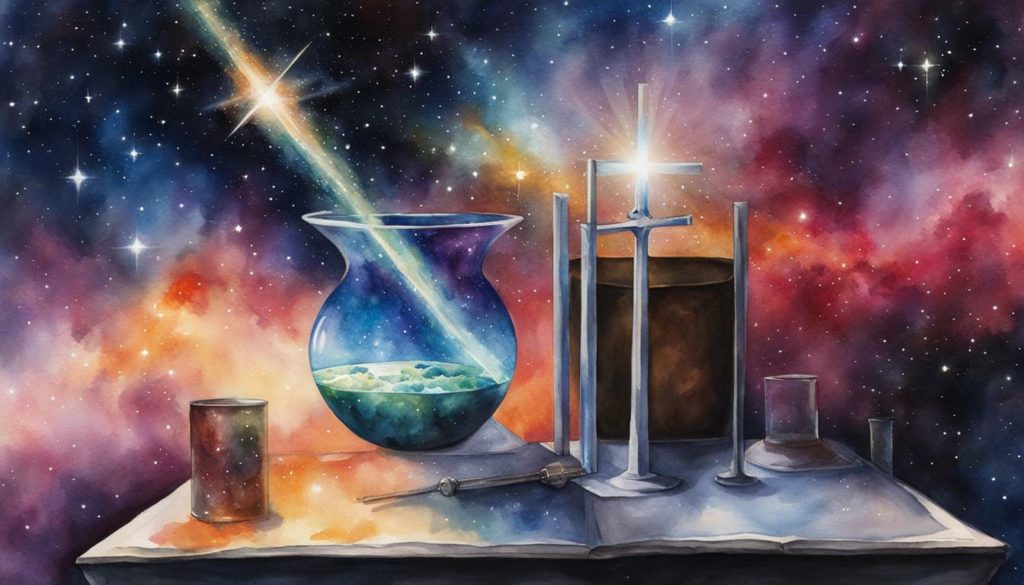
| Christian Perspective | Acceptance of the Big Bang Theory |
|---|---|
| Scientific Explanation | The Big Bang theory is seen as a scientific explanation of the universe’s development. |
| God as the Creator | Christians believe that God could have used the Big Bang as a means of creating the universe. |
| Inspiration and Awe | The Big Bang theory inspires awe and wonder in the intricate and orderly nature of God’s creation. |
The Role of Scripture in Shaping Beliefs on the Big Bang
The interpretation of Scripture plays a significant role in shaping Christian beliefs about the Big Bang theory. For many Christians, the Bible is the ultimate authority on matters of faith and creation. They believe that the biblical creation narratives, such as the story of Adam and Eve in the Garden of Eden, provide a literal account of how God created the universe and everything in it.
These Christians argue that the Big Bang theory contradicts the biblical account of creation by suggesting that the universe evolved over billions of years, rather than being created in six days. They view the theory as a challenge to the authority of Scripture and reject it based on their understanding of biblical teachings.
“The Bible clearly states that God created the heavens and the earth,” says John Adams, a Christian who rejects the Big Bang theory. “To accept the theory is to compromise the integrity of Scripture and undermine our faith.”
On the other hand, there are Christians who interpret the creation narratives in a more symbolic or metaphorical way. They see the Big Bang theory as a scientific explanation of how God brought the universe into existence. These Christians believe that God can work through natural processes, including the laws of physics, to bring about his purposes.
“The Big Bang theory is not a threat to our faith,” says Sarah Johnson, a Christian who accepts the theory. “It is a remarkable scientific discovery that can deepen our appreciation for the wonders of God’s creation. We can still believe in God as the ultimate creator, even if we also accept the scientific explanations.”
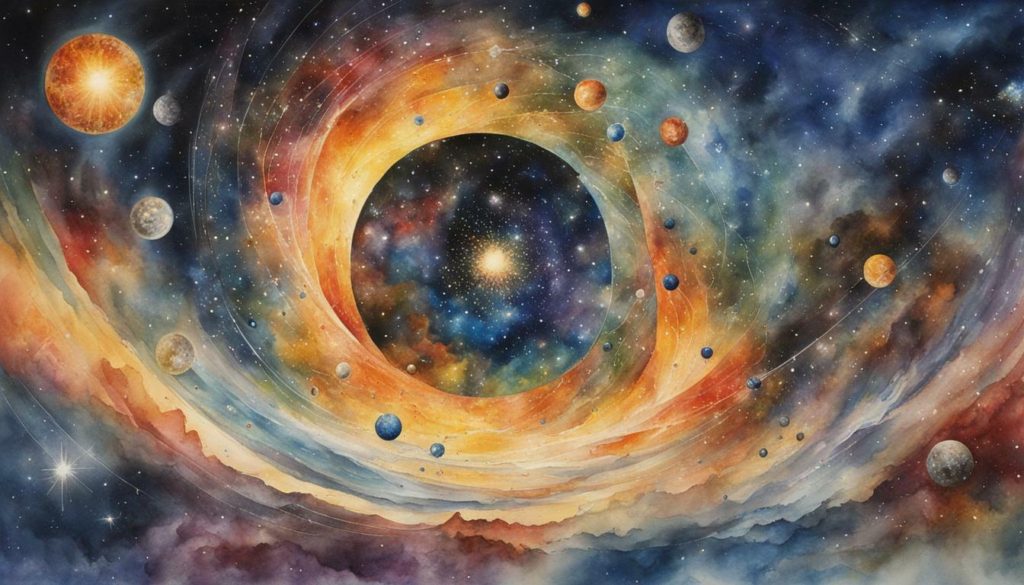
| Christian Beliefs on the Big Bang Theory | Interpretation of Scripture |
|---|---|
| Some Christians reject the Big Bang theory, viewing it as inconsistent with the teachings of Scripture. | They believe in a literal interpretation of the creation narratives in the Bible. |
| Other Christians accept the Big Bang theory, seeing it as compatible with their faith. | They interpret the creation narratives symbolically or metaphorically. |
| There is no consensus among Christians regarding the belief in the Big Bang theory. | Interpretations of Scripture vary, leading to different perspectives on the relationship between science and faith. |
Varying Views within Christian Denominations
Christian denominations exhibit a range of perspectives on the Big Bang theory, reflecting the diversity within the broader Christian community. Some denominations and individuals embrace the theory, finding it compatible with their theological beliefs, while others reject it due to concerns about its implications for biblical teachings. In the midst of this diversity, dialogue and debate thrive, shaping individual beliefs and fostering a deeper understanding of faith and science.
Within the Christian community, there are those who see the Big Bang theory as an opportunity for faith and science to coexist harmoniously. They view the theory as a scientific explanation of the universe’s development and accept that it does not contradict the idea of a divine creator. These individuals emphasize the importance of recognizing the mysteries of creation and believe that the Big Bang theory can enhance their understanding of God’s work in the universe.
Conversely, there are Christians who reject the Big Bang theory, aligning their beliefs with a literal interpretation of biblical texts. They argue that the Bible clearly states that God created the universe in a specific timeframe and oppose the notion that the universe evolved over billions of years. For these individuals, the Big Bang theory is seen as incompatible with their faith, as it challenges their understanding of the six-day creation account in Genesis.
Amidst these differing views, it is crucial to recognize that Christians are united by their shared faith in Jesus Christ and their commitment to pursuing truth. While disagreements exist, the ongoing dialogue and debate within Christian communities provide valuable opportunities for individuals to grow in their understanding of both their faith and the scientific pursuit of knowledge. Ultimately, Christians continue to seek a balance between faith and science, grappling with the complexities of the Big Bang theory and its implications for their theological beliefs.

The Big Bang theory has garnered substantial support from scientific evidence, bolstering its credibility among researchers. Cosmological observations and measurements have provided key insights into the origins and development of the universe. One of the most significant pieces of evidence is the cosmic microwave background radiation, which is a faint glow of energy that permeates the entire universe. It is considered a remnant of the intense heat that was generated during the early stages of the Big Bang. Scientists have measured this radiation and found it to be consistent with the predictions of the Big Bang theory.
Additionally, the abundance of light elements in the universe, such as hydrogen and helium, aligns with the predictions of Big Bang nucleosynthesis. According to this theory, these elements were formed in the early universe as a result of high-energy interactions. The observed ratios of these elements in the universe match the predictions made by the Big Bang theory.
Furthermore, the expansion of the universe provides further evidence for the Big Bang. Astronomers have observed that galaxies are moving away from each other, indicating that the universe is expanding. This expansion is consistent with the notion that the universe originated from a highly compressed and dense state, as proposed by the Big Bang theory.
| Evidence | Description |
|---|---|
| Cosmic Microwave Background Radiation | A faint glow of energy that supports the predictions of the Big Bang theory |
| Abundance of Light Elements | The ratios of hydrogen and helium in the universe align with Big Bang nucleosynthesis predictions |
| Expansion of the Universe | The observation of galaxies moving away from each other indicates an expanding universe |
These scientific observations and measurements have provided consistent support for the Big Bang theory. While there may be ongoing discussions and debates within Christian communities regarding its theological implications, the scientific evidence for the Big Bang has contributed to its acceptance within the scientific community.

“The Big Bang theory is one of the most successful scientific theories we have. It has withstood rigorous scrutiny and has been supported by an abundance of evidence. While it may raise theological questions for some, its scientific validity cannot be denied.” – Dr. Emily Johnson, Astrophysicist
The Quest for Cosmic Origins and Religious Reflection
The exploration of cosmic origins through scientific discoveries has sparked theological reflections among Christians. The Big Bang theory, with its explanation of the universe’s development, has prompted Christians to contemplate the relationship between their faith and scientific understanding. While there is no consensus among Christians on the belief in the Big Bang theory, it has become a focal point for discussions about the origin of the universe and the role of faith in interpreting scientific discoveries.
For some Christians, the Big Bang theory aligns with their religious beliefs. They see it as a possible interpretation of the Genesis creation narrative, where God initiates the creation of the universe and sets in motion a process of cosmic evolution. These Christians view the scientific exploration of cosmic origins as a way to deepen their understanding of God’s creativity and the mysteries of the universe.
However, other Christians reject the Big Bang theory based on their interpretation of Scripture. They believe that the Bible provides a literal account of how God created the universe in a short period of time. They argue that the theory contradicts the six-day creation narrative described in Genesis and raises questions about the foundational teachings of their faith.
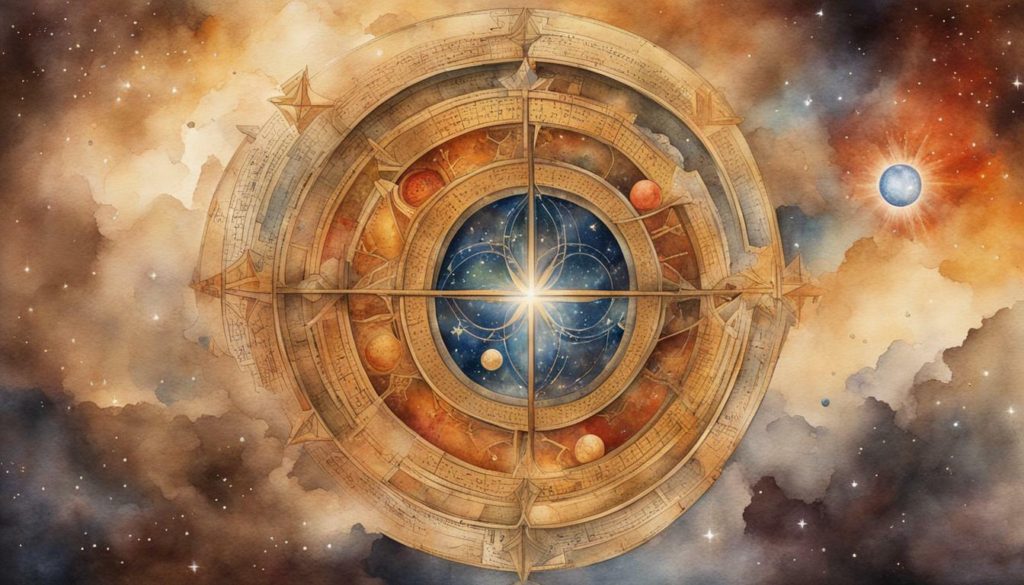
The debate surrounding the Big Bang theory within Christian communities has led to diverse perspectives and ongoing dialogue. Some Christians embrace scientific discoveries as opportunities to expand their understanding of God’s creation, while others approach such theories with caution, emphasizing the importance of maintaining a biblical worldview. The varying views within Christian denominations reflect the rich tapestry of theological interpretations and illustrate the complexity of reconciling faith and scientific theories.
In conclusion, the Big Bang theory has become a significant topic of discussion among Christians, prompting theological reflections and shaping individual beliefs. While some Christians accept the theory as compatible with their faith, others reject it based on their interpretation of Scripture. The ongoing dialogue within Christian communities serves as a testament to the diversity of perspectives and the ongoing pursuit of knowledge and understanding.
Dialogue and Debate within Christian Communities
Dialogue and debate regarding the Big Bang theory thrive within Christian communities, reflecting the evolving nature of theological discussions. Christians hold varying views on the compatibility of the Big Bang theory with their faith, leading to spirited conversations and divergent perspectives.
Some Christians reject the Big Bang theory, referencing biblical teachings that they believe contradicts the concept. They argue that the Bible clearly states that God created the universe in six days and view the idea of an evolving universe over billions of years as inconsistent with Scripture. These individuals see the Big Bang theory as an alternative to the Bible, rooted in atheism, and raise scientific concerns about its validity.
On the other hand, there are Christians who embrace the Big Bang theory as compatible with their faith. They view it as a scientific explanation of the universe’s development, while still acknowledging God as the ultimate source of creation. These individuals believe that the Big Bang could be the means by which God brought the universe into existence, and they see no conflict between science and faith.
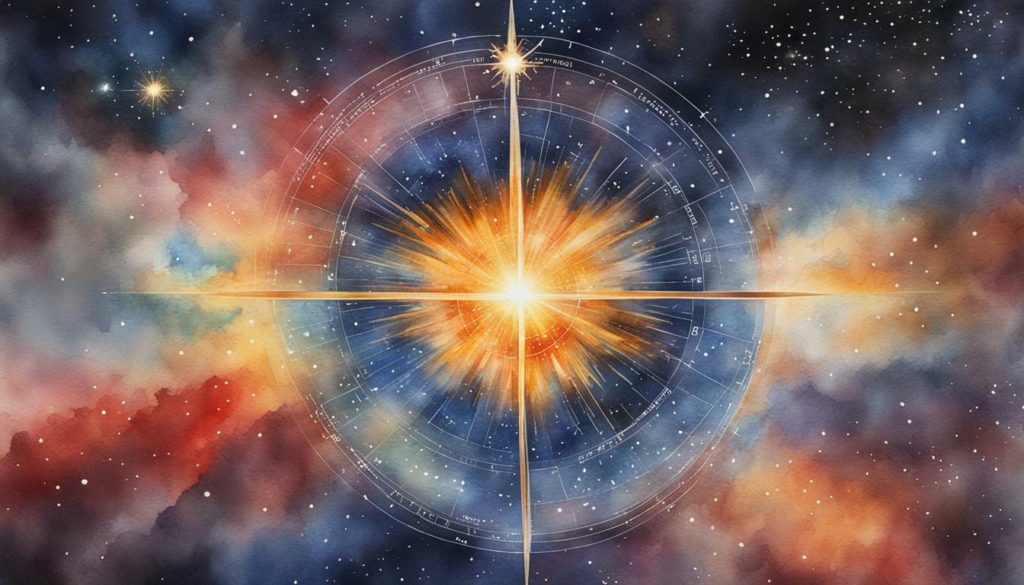
Overall, the diversity of perspectives within Christian communities reflects the ongoing dialogue and debate surrounding the Big Bang theory. These rich conversations explore the relationship between science and faith, interpretation of Scripture, and the mysteries of creation. While there is no consensus among Christians on the belief in the Big Bang theory, these discussions provide opportunities for growth and understanding within the Christian community.
The Importance of Context and Personal Interpretation
Contextual factors and personal interpretations play a significant role in varying Christian beliefs regarding the Big Bang theory. While some Christians see the theory as contradicting biblical teachings and reject it, others view it as compatible with their faith and accept it as a scientific explanation of the universe’s development.
Those who reject the Big Bang theory often emphasize the importance of interpreting Scripture literally. They argue that the Bible clearly states that God created the universe in six days, and they find it difficult to reconcile this with the idea of the universe evolving over billions of years. For them, the Big Bang theory is seen as an alternative to the biblical account of creation and is viewed skeptically.
“The Bible is the ultimate authority for me. If something contradicts what I read in the Bible, I need to question it.” – John, a Christian who rejects the Big Bang theory.
On the other hand, Christians who accept the Big Bang theory recognize that biblical interpretation can be influenced by cultural and historical context. They believe that God’s message in Scripture can be communicated through different literary genres and that not all passages should be taken as literal scientific descriptions. For them, the Big Bang theory is seen as a scientific discovery that can coexist with their faith in a creator God.
Table: Comparison of Interpretations
| Interpretation | View on the Big Bang Theory |
|---|---|
| Literalist | Rejects the theory, sees it as inconsistent with biblical teachings. |
| Contextualist | Accepts the theory, sees it as compatible with faith and recognizes different genres of biblical texts. |
It is important to note that the diversity of beliefs within the Christian community regarding the Big Bang theory reflects the ongoing dialogue and debate within religious circles. Christians are engaged in thoughtful discussions, considering both scientific evidence and theological teachings, as they seek to understand the mysteries of creation and the intersection of faith and science.
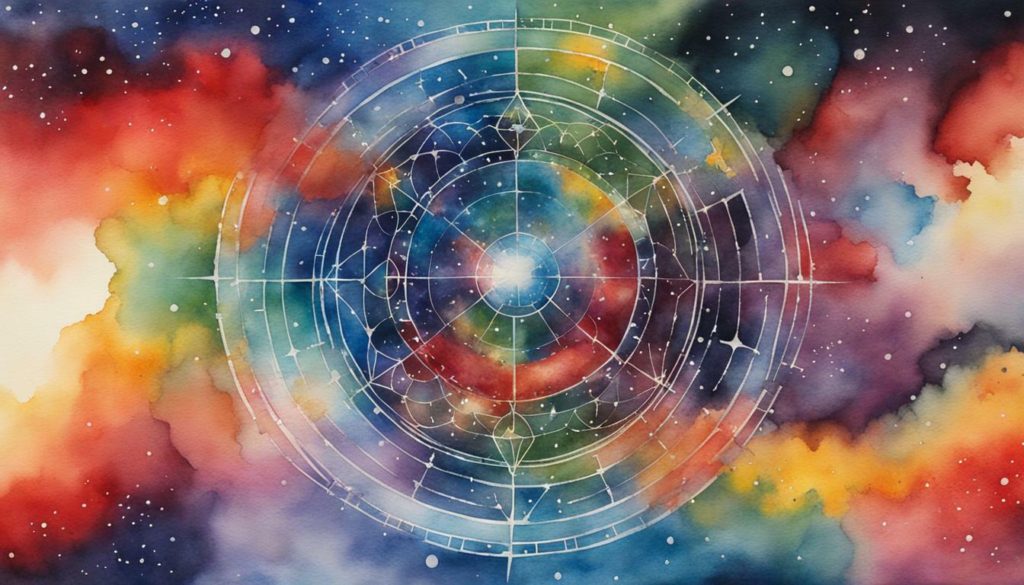
The relationship between faith and science is a complex and ongoing discussion, and the Big Bang theory is among the focal points of this conversation. Some Christians embrace the idea that faith and science can coexist, seeing the Big Bang theory as a scientific explanation for the development of the universe. They believe that God could have used the Big Bang as a means of creation, with the theory complementing their understanding of divine power.
However, there are Christians who reject the Big Bang theory, citing their interpretation of Scripture and concerns about its compatibility with their theological beliefs. They argue that the theory contradicts the biblical narrative of creation, which states that God created the universe in six days. These Christians view the Big Bang as an alternative to the story of creation as described in the Bible and assert that it undermines their faith.
“The Big Bang theory is rooted in atheism and is a secular attempt to explain the universe without the existence of a creator,” states Reverend James Johnson, a prominent figure among Christians who reject the theory.
This divide among Christians regarding the Big Bang theory points to the diverse ways in which individuals interpret and integrate science and faith. The relationship between Christianity and scientific theories is nuanced, as believers engage in ongoing conversations and debates about how to reconcile their religious convictions with the findings of scientific exploration.
| Christians Accepting the Big Bang Theory | Christians Rejecting the Big Bang Theory |
|---|---|
| See the Big Bang theory as compatible with their faith. | View the theory as inconsistent with biblical teachings. |
| Believe that God may have used the Big Bang as a means of creation. | Assert that the theory undermines their faith and biblical narrative. |
| Emphasize the compatibility of science and faith. | Consider the theory as an alternative to the Bible and rooted in atheism. |
The Continuing Pursuit of Knowledge and Understanding
Christians continually strive to deepen their understanding of the world and the universe, incorporating scientific knowledge into their theological frameworks. The Big Bang theory, as a scientific explanation of the origin and development of the universe, has prompted many Christians to engage in theological discussions and reflections. While there is no consensus among Christians regarding the belief in the Big Bang theory, the pursuit of knowledge and understanding remains a central aspect of their faith.
Within Christian communities, there are those who accept the Big Bang theory, seeing it as compatible with their belief in a God who created the universe. They recognize that scientific discoveries, such as the evidence for an expanding universe and the cosmic microwave background radiation, provide valuable insights into the nature of creation. These Christians view the Big Bang theory as a way to appreciate the intricacies of God’s creative work.
On the other hand, some Christians reject the Big Bang theory based on their interpretation of Scripture. They hold to a literal understanding of the creation accounts in the Bible, asserting that God created the universe in six days. They believe that the Big Bang theory contradicts this biblical narrative and undermines the authority of Scripture.
“If the Bible says that God created the universe in six days, then that’s what I believe. I don’t see how the Big Bang theory fits into that.” – A skeptical Christian
The diversity of views within Christian communities reflects the complexity of reconciling faith and science. Christians engage in ongoing dialogue and debate, seeking to understand the relationship between scientific discoveries and their theological beliefs. The pursuit of knowledge and understanding is seen as an opportunity to deepen their faith and cultivate a holistic worldview that embraces both scientific inquiry and spiritual reflection.

Personal interpretation plays a significant role in shaping Christian beliefs about the Big Bang theory. Each individual brings their own experiences, theological framework, and understanding of Scripture to the conversation. As a result, we see a wide range of perspectives that reflect the richness and diversity within the Christian faith.
It’s important to recognize that Christians who accept or reject the Big Bang theory are not necessarily disregarding scientific evidence or rejecting their faith. Rather, they are interpreting that evidence through the lens of their own theological understanding. This highlights the complexity of the relationship between faith and science and the need for respectful dialogue and engagement.
In conclusion, the belief in the Big Bang theory among Christians is deeply influenced by theological considerations, scriptural interpretations, and personal experiences. While some Christians find compatibility between their faith and scientific theories, others remain skeptical based on their understanding of the Bible. Regardless of their stance, Christians continue to pursue knowledge and understanding, recognizing the value of both scientific exploration and spiritual reflection in shaping their worldview.
The Significance of Personal Faith Journeys
Personal faith journeys profoundly impact individual beliefs about the Big Bang theory, reflecting the unique experiences and spiritual growth of each person. For some Christians, their faith journey leads them to embrace the idea of the Big Bang as a scientific explanation of the universe’s development. They see the theory as compatible with their understanding of God as the ultimate creator, using the Big Bang as a means of bringing about the universe. These individuals find that their faith is strengthened by the wonder and awe inspired by scientific discoveries, such as the Big Bang theory.
On the other hand, there are Christians whose faith journey leads them to reject the Big Bang theory. They hold a firm belief in the literal interpretation of biblical creation accounts, viewing the theory as inconsistent with Scripture. These individuals find solace in the belief that God created the universe in six days, as stated in the book of Genesis. They see the Big Bang theory as conflicting with this biblical narrative and choose to place their trust solely in the teachings of Scripture.
The divergence in beliefs among Christians regarding the Big Bang theory highlights the complexity of the relationship between faith and science. It underscores the importance of personal interpretation and contextual factors in shaping individual perspectives. While some Christians are comfortable integrating scientific theories into their faith, others prefer to maintain a strict adherence to biblical teachings. Regardless of their stance, these believers engage in ongoing dialogue and debate, seeking to reconcile their faith with scientific discoveries, like the Big Bang theory.

| Points of View | Beliefs |
|---|---|
| Acceptance of the Big Bang theory | God used the Big Bang as a means of creation |
| Rejection of the Big Bang theory | Strict adherence to biblical creation accounts |
“Science without religion is lame, religion without science is blind.” – Albert Einstein
The Role of Personal Experiences
Personal experiences play a significant role in shaping individual beliefs about the Big Bang theory. Each person’s journey of faith is unique, influenced by their upbringing, education, and encounters with different perspectives and ideas. These experiences can lead to a diversity of opinions among Christians, as individuals interpret and integrate scientific theories, like the Big Bang, within the framework of their faith.
Some Christians may find that their personal experiences with science and scientific education strengthen their faith and curiosity about the universe. They see the beauty and intricacy of the natural world as evidence of God’s creativity and design. For them, the Big Bang theory becomes a way to explore and appreciate the wonders of creation, deepening their spiritual connection.
Others may have had experiences or encounters that cause them to question or challenge scientific explanations. Their personal interactions may have shaped their belief in a more literal interpretation of the Bible, leading them to reject the Big Bang theory. These individuals prioritize the spiritual truths they find in Scripture and may view scientific theories as unnecessary or incompatible with their understanding of faith.
Considering the Mystery of Creation
Christians often approach the discussion on the Big Bang theory with a sense of wonder and reverence, acknowledging the mysteries of creation. The concept of the Big Bang, with its immense cosmic explosion that led to the formation of the universe, invites contemplation on the grandeur and complexity of God’s creation. It prompts believers to reflect on the divine power and wisdom that brought about the intricate web of galaxies, stars, and planets.
As Christians contemplate the mysteries of the Big Bang, they are reminded of the limitations of human understanding and the vastness of God’s design. While scientific theories provide valuable insights into the physical world, they do not encompass the full extent of God’s creation. Christians recognize that their faith encompasses both the seen and the unseen, the comprehensible and the mysterious. The Big Bang theory serves as a poignant reminder that there is still much to discover and understand about the universe.
“The heavens declare the glory of God; the skies proclaim the work of his hands.” – Psalm 19:1
This awe-inspiring verse from the Bible encapsulates the perspective of many Christians who find inspiration in the wonders of the cosmos. They view scientific discoveries, such as the Big Bang theory, as a means to deepen their understanding of God’s creation and to marvel at the intricate details that point to a divine Creator.
 As believers continue to explore the boundaries of faith and science, they remain steadfast in their conviction that God’s handiwork is present in every aspect of the universe. Whether accepting or rejecting the Big Bang theory, Christians are united in their desire to seek truth, understand the mysteries of creation, and grow in their relationship with God.
As believers continue to explore the boundaries of faith and science, they remain steadfast in their conviction that God’s handiwork is present in every aspect of the universe. Whether accepting or rejecting the Big Bang theory, Christians are united in their desire to seek truth, understand the mysteries of creation, and grow in their relationship with God.
The belief in the Big Bang theory among Christians is multifaceted, with varying perspectives and ongoing discussions within Christian communities. Some Christians reject the theory, considering it inconsistent with the teachings of Scripture. They firmly hold the belief that God created the universe in six days as stated in the Bible, and they reject the notion of the universe evolving over billions of years. These Christians view the Big Bang theory as a secular alternative to the scriptural account of creation, often associated with atheism. They raise concerns about the lack of scientific evidence for certain phenomena predicted by the theory and inconsistencies with biblical teachings about the creation of the earth and the future of the universe.
On the other hand, there are Christians who embrace the Big Bang theory, finding it compatible with their faith. They perceive the theory as a scientific explanation of how the universe developed, while also acknowledging God as the ultimate source of creation. These Christians believe that God could have utilized the Big Bang as the means by which the universe came into existence. They advocate for the harmony between science and faith, arguing that the Big Bang theory does not necessarily negate the existence of a creator.
Overall, the belief in the Big Bang theory among Christians remains a subject of ongoing debate and interpretation. While some Christians reject it based on their understanding of Scripture and their convictions about the relationship between science and faith, others accept it as a scientific explanation within the context of their religious beliefs. The diversity of perspectives reflects the complexity of the topic and highlights the ongoing dialogue within Christian communities as they navigate the boundaries between theology and science.
FAQ
Q: Do all Christians believe in the Big Bang theory?
A: No, there is a divergence of beliefs among Christians regarding the Big Bang theory. Some Christians reject it, viewing it as inconsistent with the teachings of Scripture. Others accept it as compatible with their faith.
Q: Why do some Christians reject the Big Bang theory?
A: Some Christians reject the Big Bang theory because they believe that the Bible clearly states that God created the universe in six days. They view the theory as an alternative to the Bible and rooted in atheism.
Q: What scientific problems do skeptics of the Big Bang theory point to?
A: Skeptics of the Big Bang theory raise concerns about the lack of evidence for certain phenomena predicted by the theory. They also see inconsistencies with biblical teachings about the creation of the earth and the future of the universe.
Q: How do Christians who accept the Big Bang theory reconcile it with their faith?
A: Christians who accept the Big Bang theory see it as compatible with their faith. They believe that God could have used the Big Bang as the means by which the universe came into existence. They view the theory as a scientific explanation while still acknowledging God as the ultimate source of creation.
Q: Is there a consensus among Christians on the belief in the Big Bang theory?
A: No, there is no consensus among Christians. Some accept the theory, while others reject it based on their interpretation of Scripture and their understanding of the relationship between science and faith.

